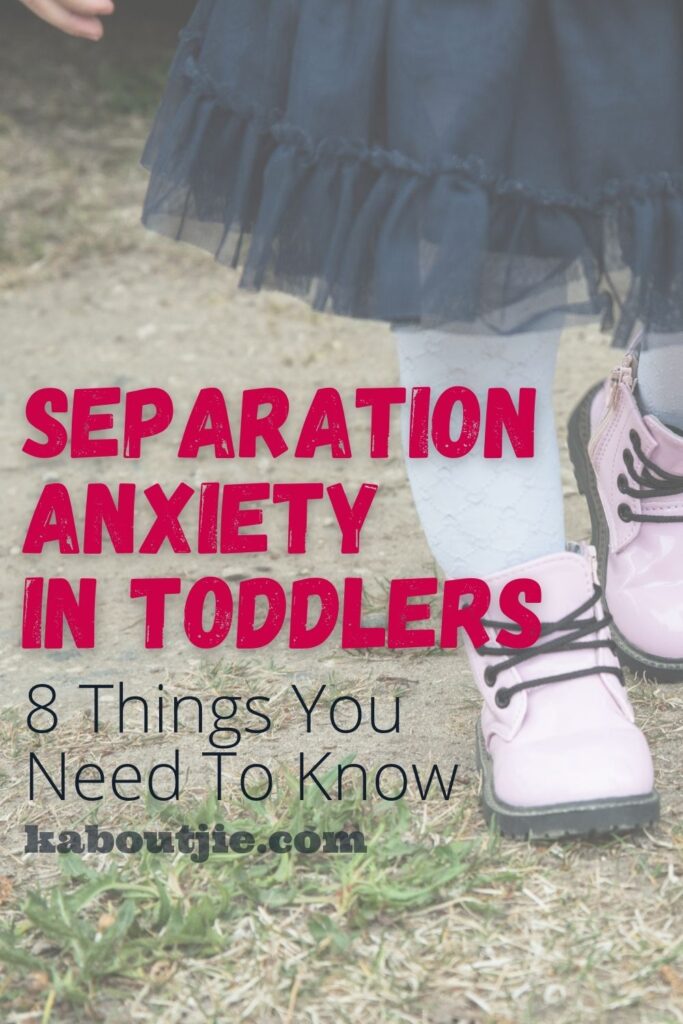Separation anxiety in toddlers is something that most parents deal with at some point. Children display crying, clinginess, and crying during early childhood and these reactions are a normal phase of development. It may start before your child’s first birthday and it may resurface at about four years of age.
While the timing and level of intensity may vary for different children, it is essential to remember that a small degree of anxiety over mom or dad leaving is not unusual, even when your child gets older. With the appropriate strategies and understanding the issue can be resolved and the separation anxiety will disappear entirely as he gets older.
***Disclosure -The links in this post may contain affiliate links and I may receive a small commission if you make a purchase after clicking on a link.***

What Is Separation Anxiety Disorder?
In some children, the separation anxiety stays put, despite the parent’s best efforts. The child experiences ongoing intense separation anxiety while attending elementary school and going forward. If the separation anxiety is extreme enough to start interfering with normal activities such as friendships and school and goes on for months, instead of days, it is possible that your child has separation anxiety disorder. Separation anxiety disorder can be treated. There are lots of things you can do to make your child feel safe and less anxious.
8 Ways To Alleviate Normal Separation Anxiety In Toddlers
If your child display signs of normal separation anxiety, you can do the following to make it easier on them:
- Start practicing separation – Leave your child with someone trusted for short periods at first until he starts getting used to separation, then slowly start leaving him for longer periods.
- Plan separations after feedings or naps since babies are more inclined to separation anxiety when they feel hungry or tired.
- Avoid long goodbyes and establish a short goodbye ritual – avoid making a big deal out of leaving. Give him a goodbye kiss or a hug and do not stall.
- Always return at the time that you have promised – this is essential for him to develop confidence to handle the separation.
- Keep the familiar around whenever possible – try to get the sitter to come to your house. If you must drop him off somewhere else, take a familiar toy or comfort object with.
- Stick to a constant main caregiver on a long-term basis.
- Stick to child-friendly television – avoid frightening shows.
- Reassure him that everything will be fine and stay consistent. Try not to give in and stick to a consistent routine.

6 Signs To Identify Separation Anxiety Disorder
Children who have separation anxiety disorder are constantly fearful or stressed about separation. Many are feeling overwhelmed and display symptoms that include:
- A fear that something bad will happen to a loved one while being separated from them. The child will be constantly worried about a parent getting hurt or becoming ill.
- Anxiety that something unexpected is going to happen that will prolong the separation, for instance getting lost or getting kidnapped.
- Refusal to attend school – he will display an unwarranted fear of attending school and will do anything in his power not to go.
- Unwillingness to go to sleep – separation anxiety disorder can prevent the child from falling asleep due to nightmares about separation or the fear of being on his own.
- Physical illness like stomach pain or headaches – kids with separation anxiety disorder often complain about feeling sick.
- Clinging to your arm or leg once you try to step out.
Symptoms That Warrant Professional Help
- Tantrums or clinginess that is not appropriate for his age.
- Withdrawal from family, friends, or peers.
- Continuous complaints of physical illness.
- Extreme fear of leaving your home.
- Preoccupation with severe guilt or fear.
- Refusal to attend school for weeks.
Conclusion
We hope you have found this article helpful. Separation anxiety is normal for children at certain ages. However, if it does not go away and your child displays any of the symptoms associated with separation anxiety disorder, it is time to enlist professional help.
 Kaboutjie SA Mommy Blogs by Lynne Huysamen
Kaboutjie SA Mommy Blogs by Lynne Huysamen





Interesting read with great tips. My kids will start at a new day care and I’m so worried that they would have anxiety, as excited as they are, this is my biggest fear. Definitely incorporating these tips real soon.
Oh Zoereena I totally get that! Every time my kids have started daycare or a new school it has been a time of great anxiety for me and certainly for my older child too! Good luck getting your kids started in the new daycare.